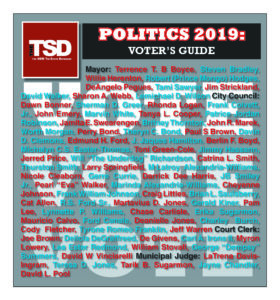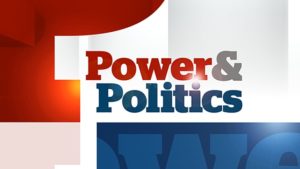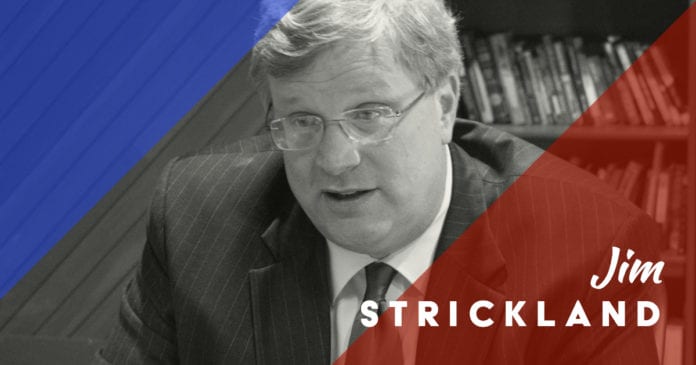Updated: Profiles of all three of the leading candidates for Memphis Mayor are now live online. Excellent reporting and writing by Erica R. Williams. Click to access the candidate of your choice:
Memphis Mayor Jim Strickland is optimistic. With the October 3 election less than a month away, the incumbent, who is completing his first term as mayor, believes the city’s voters will choose “results over rhetoric” to re-elect him.
“We have more progress to make, but the city has come a long way and we have seen results,” he said. “We’re now moving in the right direction.”

Adamant that the city has moved forward since he took office, Strickland isn’t taking all the credit, attributing the growth to combined efforts from city, county and state government.
Assessing his accomplishments and those of his administration, Strickland touted growth in economic development, universal Pre-K funding, police recruitment, and an increase in revenue for minority and women-owned businesses.
“The challenges that Memphis has had for decades are not solvable in three-and-a-half years,” he said. “I’d like another four years to tackle those issues.”
A stark proponent of growing minority and women-owned businesses, Strickland credits former city councilman and businessman Fred L. Davis for exposing him to some sobering statistics before he became mayor.
“I’ll never forget when he told me, ‘If I added up all the business transactions in the city of Memphis, one percent is spent with African Americans,” Strickland recalled. “That’s wrong on so many levels in a city that is predominately African American. If you want to grow the city, you have to grow black wealth.”
As mayor, Strickland and his team began focusing on growing minority and women-owned businesses. Since then, Black Enterprise magazine has named Memphis the #1 city for black-owned businesses. Leaders in other cities, said Strickland, have inquired about using Memphis’ model to grow their minority-owned businesses efforts.
The city’s Office of Diversity and Compliance has increased its contracts with minority-owned and women businesses to 20 percent. It was at 12 percent before Strickland took office.

Shelby County Commissioner Tami Sawyer, who is also running for mayor, has asked for the number to be re-calculated after Strickland and his team admitted that there was an error in the reporting earlier this year. In January during his State of the City address, Strickland said that spending was up to 24 percent, but it was later found to be 18 percent at the time. Strickland and his team said they’re confident that the current number is accurate.
Last year, the city launched The 800 Initiative, with a goal of growing the revenue of 800 minority-owned businesses by $50 million by 2023. And recently, city leaders declared that $50 million-plus is being spent with minority-owned businesses in the Cook Convention Center renovation project.
“This campaign needs to be about results and not rhetoric,” Strickland said. “My opponents talk about this, but they don’t have the record to support their rhetoric. (Former Mayor Dr. Willie W.) Herenton only increased it by 8 or 9 percent when he was in office. He says he has unfinished business; well, you need to be able get it done in 18 years.”
Strickland also referenced Sawyer and what he noted as her lack of success with minority-owned businesses.
“Commissioner Sawyer and the county’s MWBE (minority and women-owned business enterprises) business is only at 3 percent,” he said.

With Sawyer calling it “morally wrong” that the city does not allot any funding to Shelby County Schools, Strickland pushed back.
“Unless you are going to cut back on police services and fire services or raise taxes, it’s not going to be done,” Strickland said. “But we are giving back to education in other ways.”
Through a city and county partnership, Strickland was able to invest in universal Pre-K with no new taxes. The plan’s goal is to ensure that Pre-K is accessible to all eligible by the year 2020.
Fielding Herenton’s criticism that Strickland is weak on crime, the incumbent shot back that Memphis was listed as the leading U.S. city for crime in 2006, which fell during Herenton’s mayoral watch.
Earlier his year, the Tennessee Bureau of Investigation released a report that cited “significant drops” in crime in Memphis, including decreases in robberies, property crimes, burglaries and domestic violence. However, homicide rates spiked to 14.5 percent.
“The data says that we are making progress and I believe that we would have made more progress if we would have had more police,” Strickland said.
His public safety plan consists of building the police force, increasing penalties for violent crimes, investing in youth through mentorship, jobs and programing, and expanding workforce re-entry programs.
The police department has hired close to 500 new officers since Strickland took office. He emphasizes that his approach to combating crime differs from his opponents.
“One says we don’t need police officers, which most residents will disagree with,” Strickland said of Sawyer.
“When my other opponent (Herenton) was mayor we had the highest crime rate in the country. And he’s also been quoted saying that there is nothing any mayor can do about crime. And I disagree with that.”
While he supports criminal justice reform as it relates to nonviolent offenders, Strickland said, “But we have to be tough on those who commit violent crimes.”
Overall, the city has momentum and is headed in the right direction, said Strickland, pointing to more than 24,000 Memphians who have gotten jobs since he became mayor.
“I am personally inserting myself in economic development,” he said. “I’ve been recognized for keeping ServiceMaster in Memphis, the St. Jude expansion that resulted in an additional 1600 jobs and the recent printing company Mimeo relocating its headquarters to Memphis.”
He’s expecting more opportunities to come to the city, putting more Memphians to work at livable wages.
“I raised the minimum wage that we incentivize to $13 an hour, which is a livable wage in Memphis,” he said. “But many of the jobs pay $16 an hour.”
The livable wage calculator issued by the Massachusetts Institute of Technology concluded that in Shelby County, $11 is a livable wage for an adult with no children. That number increases to $22, if there is a child in the household.
Strickland said that despite the challenges still evident, he’s optimistic about the future, if he’s re-elected.
“I guarantee more Memphians have hope now than four years ago,” he declared confidently. “We are ready to roll up our sleeves and tackle these challenges, but we also have to celebrate the good things.”


